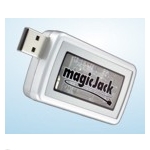 The Federal Communications Commission last week put the magicJack business model in jeopardy when it ruled that the carrier was not entitled to collect access charges for calls terminating to its customers through its affiliate company YMax. The FCC ruling came in response to a complaint by AT&T.
The Federal Communications Commission last week put the magicJack business model in jeopardy when it ruled that the carrier was not entitled to collect access charges for calls terminating to its customers through its affiliate company YMax. The FCC ruling came in response to a complaint by AT&T.
But although it represents a victory for AT&T, it may be only a partial victory because the ruling also left open the possibility that YMax and other companies that terminate calls for low-cost over-the-top VoIP providers might be able to collect access charges now or in the future, depending how their access charge tariffs are written.
magicJack offers unlimited VoIP calling at low rates for people who purchase a device from the company that is designed to send and receives voice calls in VoIP form over a broadband connection. It has been speculated that the reason magicJack can afford to offer such low prices is because YMax collects access charges on calls to magic Jack customers. Like other VoIP providers, magicJack does not connect directly to the public telephone network but instead uses a company certified as a competitive local exchange carrier (in this case YMax) to terminate calls from the public phone network to its customers.
In the new ruling, the FCC stopped short of saying that CLECs cannot collect access charges on calls terminated for VoIP providers, explained Steve Augustino of telecom law firm Kelley, Drye & Warren in a blog post. Instead, Augustino said, the FCC “held that magic Jack customers were not ‘end users’ under the [YMax] tariff because magic Jack customers do not ‘use’ a service they obtain under the terms and conditions of the tariff.” In addition, Augustino noted that the FCC said YMax “does not provide ‘end office switching’ or ‘transport’ services because YMax does not provide connections to the magic Jack customers via ‘station loops’ or ‘end user lines.’”
In the ruling, the FCC also made a point of saying that “we need not, and do not, address issues regarding the intercarrier compensation obligations, if any, associated with VoIP traffic in this order.”
magicJack and YMax may be in a fairly unique position, in that YMax has CLEC certification throughout the U.S. and is owned by the same parent company as magicJack. Most other over-the-top VoIP providers are not so well positioned to tap the access charge revenue stream. But if any of them are doing so, they could face similar challenges.
YMax meanwhile, may find itself responding to a flood of claims from carriers other than AT&T that have been paying terminating access charges to magic Jack users.
The FCC, meanwhile, is getting ready to rule on whether VoIP providers should be required to pay access charges when their customers call customers of other companies. Some VOIP providers have argued that VoIP is not a telecommunications service and therefore they are exempt from access charges.
Longer term, however, the FCC has announced plans to phase out the access charge system—a process that is expected to take a number of years. magicJack already has taken steps to try to make that happen sooner rather than later, offering carriers free equipment if they agree to enter into a “bill and keep” agreement with YMax. In retrospect, magicJack/YMax may have done that as a defensive move in the event that the FCC ruled in favor of AT&T. Now, considering that AT&T did indeed win, carriers may have little motivation to enter “bill and keep” agreements with YMax because they may believe they don’t have to pay access charges to YMax anyway.


